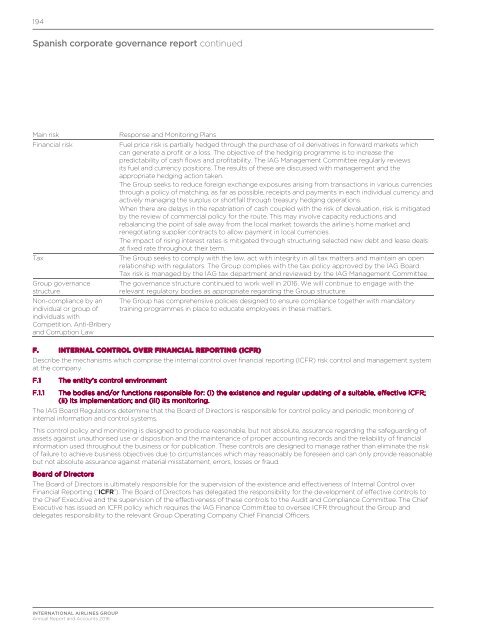Annual report and accounts 2016
Create successful ePaper yourself
Turn your PDF publications into a flip-book with our unique Google optimized e-Paper software.
194<br />
Spanish corporate governance <strong>report</strong> continued<br />
Main risk<br />
Financial risk<br />
Tax<br />
Group governance<br />
structure<br />
Non-compliance by an<br />
individual or group of<br />
individuals with<br />
Competition, Anti-Bribery<br />
<strong>and</strong> Corruption Law<br />
Response <strong>and</strong> Monitoring Plans<br />
Fuel price risk is partially hedged through the purchase of oil derivatives in forward markets which<br />
can generate a profit or a loss. The objective of the hedging programme is to increase the<br />
predictability of cash flows <strong>and</strong> profitability. The IAG Management Committee regularly reviews<br />
its fuel <strong>and</strong> currency positions. The results of these are discussed with management <strong>and</strong> the<br />
appropriate hedging action taken.<br />
The Group seeks to reduce foreign exchange exposures arising from transactions in various currencies<br />
through a policy of matching, as far as possible, receipts <strong>and</strong> payments in each individual currency <strong>and</strong><br />
actively managing the surplus or shortfall through treasury hedging operations.<br />
When there are delays in the repatriation of cash coupled with the risk of devaluation, risk is mitigated<br />
by the review of commercial policy for the route. This may involve capacity reductions <strong>and</strong><br />
rebalancing the point of sale away from the local market towards the airline’s home market <strong>and</strong><br />
renegotiating supplier contracts to allow payment in local currencies.<br />
The impact of rising interest rates is mitigated through structuring selected new debt <strong>and</strong> lease deals<br />
at fixed rate throughout their term.<br />
The Group seeks to comply with the law, act with integrity in all tax matters <strong>and</strong> maintain an open<br />
relationship with regulators. The Group complies with the tax policy approved by the IAG Board.<br />
Tax risk is managed by the IAG tax department <strong>and</strong> reviewed by the IAG Management Committee.<br />
The governance structure continued to work well in <strong>2016</strong>. We will continue to engage with the<br />
relevant regulatory bodies as appropriate regarding the Group structure.<br />
The Group has comprehensive policies designed to ensure compliance together with m<strong>and</strong>atory<br />
training programmes in place to educate employees in these matters.<br />
F. INTERNAL CONTROL OVER FINANCIAL REPORTING (ICFR)<br />
Describe the mechanisms which comprise the internal control over financial <strong>report</strong>ing (ICFR) risk control <strong>and</strong> management system<br />
at the company.<br />
F.1 The entity’s control environment<br />
F.1.1 The bodies <strong>and</strong>/or functions responsible for: (i) the existence <strong>and</strong> regular updating of a suitable, effective ICFR;<br />
(ii) its implementation; <strong>and</strong> (iii) its monitoring.<br />
The IAG Board Regulations determine that the Board of Directors is responsible for control policy <strong>and</strong> periodic monitoring of<br />
internal information <strong>and</strong> control systems.<br />
This control policy <strong>and</strong> monitoring is designed to produce reasonable, but not absolute, assurance regarding the safeguarding of<br />
assets against unauthorised use or disposition <strong>and</strong> the maintenance of proper accounting records <strong>and</strong> the reliability of financial<br />
information used throughout the business or for publication. These controls are designed to manage rather than eliminate the risk<br />
of failure to achieve business objectives due to circumstances which may reasonably be foreseen <strong>and</strong> can only provide reasonable<br />
but not absolute assurance against material misstatement, errors, losses or fraud.<br />
Board of Directors<br />
The Board of Directors is ultimately responsible for the supervision of the existence <strong>and</strong> effectiveness of Internal Control over<br />
Financial Reporting (“ICFR”). The Board of Directors has delegated the responsibility for the development of effective controls to<br />
the Chief Executive <strong>and</strong> the supervision of the effectiveness of these controls to the Audit <strong>and</strong> Compliance Committee. The Chief<br />
Executive has issued an ICFR policy which requires the IAG Finance Committee to oversee ICFR throughout the Group <strong>and</strong><br />
delegates responsibility to the relevant Group Operating Company Chief Financial Officers.<br />
INTERNATIONAL AIRLINES GROUP<br />
<strong>Annual</strong> Report <strong>and</strong> Accounts <strong>2016</strong>



